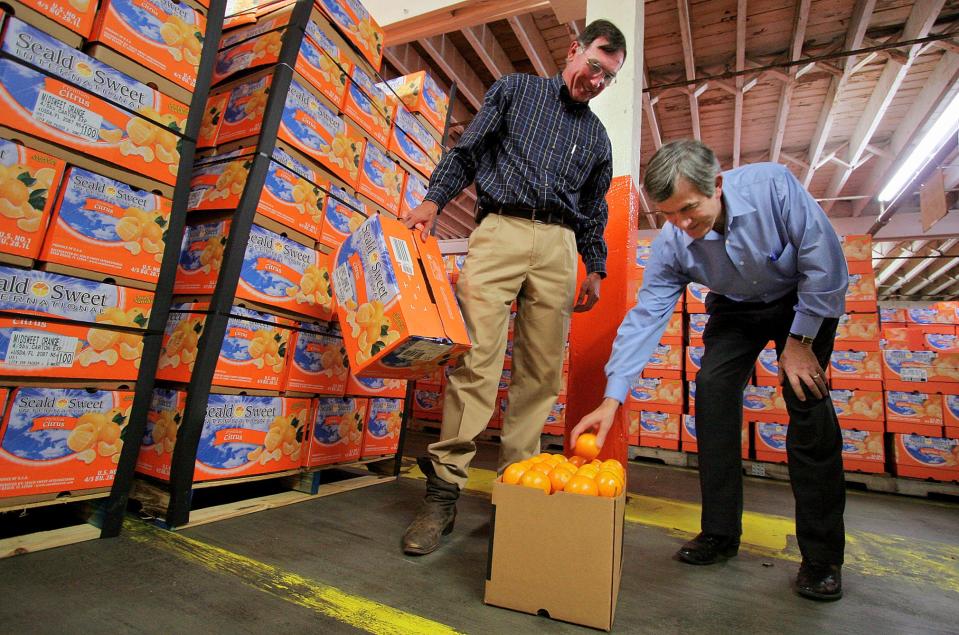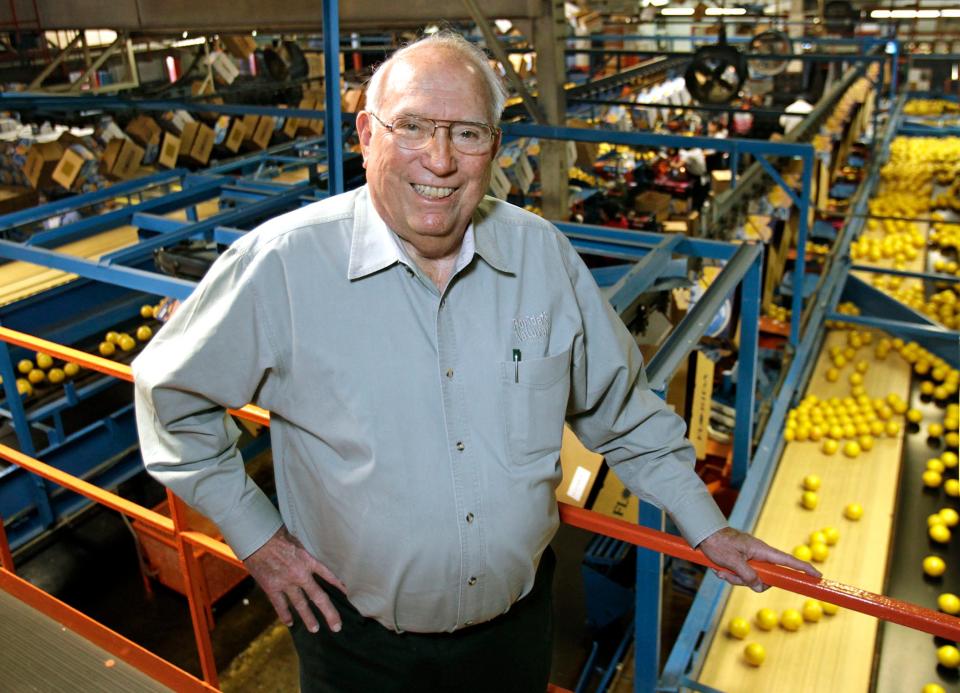Hunt Bros. citrus packinghouse in Lake Wales has closed. Here's what that means
The Hunt Bros. Inc. citrus packinghouse in Lake Wales has closed permanently, leaving just 13 such packinghouses statewide.
The primary reason for the closure, which occurred May 6, was the impact of Hurricane Irma on company groves in 2017, according to a letter sent to employees by one of the owners, Frank Hunt III, in April. The third-generation family-owned packinghouse opened in 1928.
“It was certainly our desire to keep it (the packinghouse) going," Hunt said in the letter on April 22, which was first reported by Citrus Industry magazine. "Prior to Hurricane Irma, we were surviving and perhaps even thriving. In fact, in the 2016-17 season we had the second most shipments of all Florida packinghouses. With Irma, the packinghouse lost its fruit supply overnight. We have held on the last 5 years hoping the trees would bounce back, but unfortunately, they are crashing and must be replanted. That means possibly a decade before supplies will return to pre-Irma levels."

April forecast: Florida's citrus crop forecast continues to sour
Orange juice on cereal?: Tropicana Crunch looks to make a splash
The packinghouse at 2404 Hunt Brothers Road had employed 50 workers, who are receiving assistance from Hunt Bros. to find new jobs within the citrus industry.
In a phone interview Tuesday, Hunt Bros. Inc. President Ellis Hunt said, "We're still in the citrus business, which we have been in since 1922. The only thing that's changing is everything will go to Florida's Natural for juice."
The family business still runs 4,000 acres of citrus groves, he said, as the fourth generation of the family is eager to continue the enterprise.
Citrus greening also led to the closure of the fresh fruit packing and shipping operations, as they lost more than 500 acres of grapefruit groves in South Florida in the Immokalee and LaBelle areas because of hurricane-related flooding, Ellis Hunt said.
Citrus trees cannot take standing water for more than two weeks, he said. "They just did not bounce back."
Hunt Bros. also sold grove lands in Lake Wales totaling nearly 500 acres. Hunt Bros. has replanted 600 acres of citrus.
"We're looking at some new opportunities," Ellis Hunt said. The packinghouse can offer a potential new tenant, cold storage for up to 880 pallets at as low as 33 degrees Fahrenheit and 109,000 square feet of under-roof warehousing space with loading bays.
According to Shelley Rossetter, assistant director of global marketing for the Florida Department of Citrus, said "this closure would bring the number of currently operating packinghouses in the Florida citrus industry down to 13.”
In the 2000-01 citrus season, Florida had 106 citrus packinghouses, according to previous Ledger reporting. That number decreased to 26 in the 2016-17 season.
Five of the state's remaining packinghouses are in Polk County. They include Dundee Citrus Growers Association with facilities in Dundee and Lake Hamilton, Peace River Packing Co. in Fort Meade, John Stephens Inc. in Frostproof, WG Roe & Sons in Winter Haven and Ridge Island Groves in Haines City.
Declining harvest and sales

Executive transition: Florida's Natural Growers announces next CEO
The packinghouse closure comes at a time when Florida's lagging citrus industry continues to see a decline in the crop for the current growing season.
The 2021-22 harvest is predicted to be the lowest yield since before World War II.
The latest sign of trouble came with a winter cold snap. Shortly afterward, the U.S. Department of Agriculture’s April forecast dropped its Florida orange harvest another 7% from the March update, leaving the decline at nearly 19% for the season.
The overall citrus crop for the current year is on pace to fill 42.6 million boxes, including 38.2 million boxes of oranges, 3.6 million boxes of grapefruit and 800,000 boxes of specialty crops.
For an industry that two decades ago produced 230 million boxes of oranges — 287.2 million boxes of citrus in all — the current season would be the smallest amount since 40.87 million boxes were produced in the 1937-38 season, The Ledger reported.
Additionally, the latest Nielsen Retail Sales report has total orange juice sales down by 0.2% compared to the pre-pandemic level of 2019.
To bolster sales, the Florida Department of Citrus had a budget of about $19 million this season (2021-22) to promote Florida-grown citrus.
In an April 22 news update, Steve Johnson, FDOC's president and chairman of the Florida Citrus Commission, said inflation was a factor the department would have to fold into its plans for next season.
The Consumer Price Index shows inflation was up by 8.5% over the past 12 months with increases in the indexes for gasoline, shelter and food as the largest contributors.
In past studies looking at consumer’s willingness to buy orange juice, he said, “consumers are also more likely to purchase when they hear about the positive attributes of orange juice, such as its great taste and health benefits, through advertising or media coverage.
“Consumers are also willing to pay more for 100% orange juice when they associate it with Florida,” he said.
“The Department is also analyzing how inflation may impact consumers in the months ahead and exploring which marketing activities may help ensure Florida Orange Juice remains in carts as prices increase across the board,” Johnson said.
In the Citrus Department's own survey, director of economic and market research Marisa Zansler reported that between May and December 2021, “8% of consumers had purchased less food, 23% purchased store brands or economy sizes, and 32% looked for in-store promotions, deals, or coupons,” he said.
“With inflation increasing since these figures were collected, it is likely safe to assume that buying habits have changed, as well,” Johnson said.
Citrus groves lost
According to a recent land survey by SVN Saunders, Ralston Dantzler Real Estate, a commercial real estate company, Polk County had the highest rate of citrus groves lost to development or other crops of 12 counties in Central Florida last year.
Of the 71 groves sold in Central Florida in 2021, Polk had the highest number at 26.
The size of each grove ranged from 19 acres to 2,539, the report said. In all, 16,289 acres of citrus groves were sold totaling more than $118.3 million. Per acre, prices ranged from $3,571 to $14,500. The largest sale in 2021 was in Charlotte County at $12.8 million, or $5,041 per acre.
“Our Florida citrus growers are the hardest working and most resilient in the world," Agriculture Commissioner Nikki Fried said Monday. "While they have faced many challenges in recent years – from hurricanes and more extreme weather to unfair foreign trade to harmful citrus greening – our department remains committed to supporting our proud citrus growers every way we can.”
According to the Citrus Hall of Fame, which inducted two Hunt brothers, the founder of the family business, Deeley A. Hunt moved to Florida in 1919 and studied at the University of Florida.
In 1922, he and his brother, Charles Hunt, founded Hunt Bros. Inc., a citrus grove and caretaking business in Lake Wales.
Deeley Hunt bought his brother’s interest in 1938, and by 2008 the company included nearly 5,000 acres. In 1928, the brothers built their first packinghouse in Lake Wales.
In 1930, Deeley Hunt was one of six founding members of the Florida Citrus Canners Cooperative, which later became Florida’s Natural. He also held leadership roles at Citrus World Inc. He served as vice president of the company for 15 years. In 1946, he became president and general manager, a position he held until 1951.
He was a member of the first board of directors of Florida Citrus Mutual and served on the board of Seald-Sweet Growers Inc. He died in 1984.
Paul Nutcher can be reached at PNutcher@gannett.com.
This article originally appeared on The Ledger: Lake Wales' Hunt Bros. citrus packinghouse, open since 1928, closed May 6
